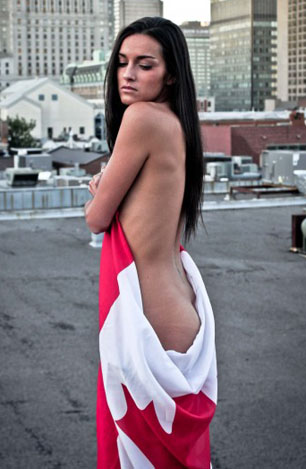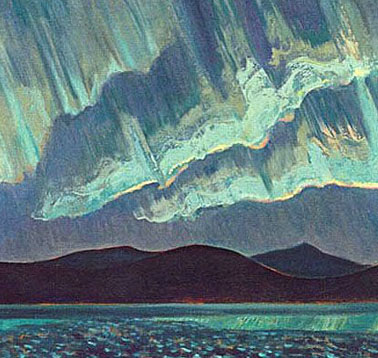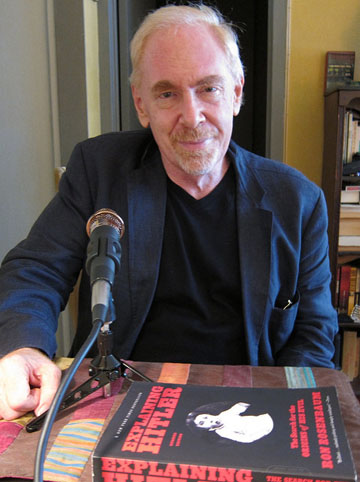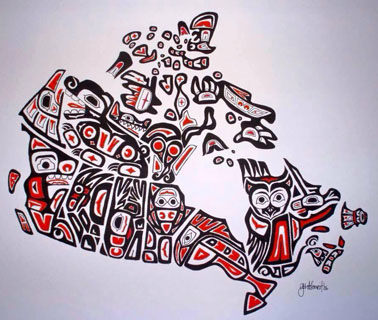How about the Pontiac or Louis Riel Block? : global-village Canadiana (and North Americana) in the winter of 2017
Feb 22nd, 2017 | By Randall White | Category: In Brief
TORONTO, ONTARIO, CANADA ETC, Mid-to-late February 2017.
RE : Steinmeier in Germany, Rosenbaum on Trump, Carlos Fraenkel on a mosque in Quebec City, and a footnote on changing the name of the Langevin Block in Ottawa to the Pontiac (or Louis Riel) Block.
I first started pondering this quartet of obscure but deep political thoughts on the day that the snows came down. It was a winter wonderland in the old streetcar suburbs.
We went for coffee on the local main street, under rejuvenation through contextual condo development – the unsettling new urban mainstream in affordable housing. And somehow the flow began, in between other things with more immediate priority :
(1) We had just heard that the Social Democrat Frank-Walter Steinmeier had been elected President of Germany. I think  this should be more interesting to Canadians than it is in the winter of 2017. I could not convince my coffee-drinking partner, but that’s just the point …
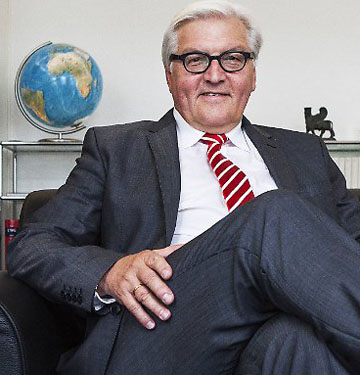
Frank-Walter Steinmeier, president (ceremonial head of state) of Germany. Critic of Donald Trump and Brexit in the UK. And according to Chancellor Angela Merkel : “an excellent president who will enjoy wide support.”
The President of Germany is nothing like the President of the United States. As the Associated Press explains, the office “has little executive power, but is considered an important moral authority and symbol of the country as its host for visiting dignitaries.” It is in fact very much like the present office of Governor General in Canada.
Angela Merkel, the Chancellor of Germany – or as we say in Canada, following the UK and France, prime minister (or premier ministre) – remains the practical chief executive of the German federation : or “head of government” as opposed to “head of state.” And her next electoral test is not until September 24, 2017.
Meanwhile, Ms Merkel relates to the new President Frank-Walter Steinmeier more or less as Justin Trudeau relates to Governor General David  Johnston.
And what should be interesting to we Canadians in this 150th anniversary year of our 1867 confederation is that the office of President of Germany is one model for what the office of Governor General of Canada could evolve into, after the sad passing of Good Queen Bess II – offshore in the United Kingdom.
The crux of the issue is how do you select what some branches of Canadian officialdom still call the Queen’s representative when there is no hereditary monarch to make the choice? (Strictly in theory of course : even in Canada today the real choice is made not by the monarch but by the democratically “elected” Canadian prime minister – which is probably even worse!.)
As the Associated Press explains again, in 2017 the new German President “Steinmeier was elected in Berlin by the assembly made up of the 630 members of parliament’s lower house and an equal number of representatives from Germany’s 16 states.”
In Canada this would imply an independent Canadian Governor General (or President even) “indirectly elected” by the current 338 members of the Canadian House of Commons, and an equal number of representatives from the 10 provinces and three territories.
This is the more conservative option for choosing ceremonial heads of state in independent parliamentary democracies. A variation on the theme also appears in the modern constitution of Canada’s fellow Commonwealth of Nations member, the Republic of India.
Personally, I lean  towards the more progressive and democratic option of direct election by the sovereign people – as now long (and successfully) practised in Ireland and Iceland. But I think involving Canadian provinces in some nominating process makes sense as well.
In any case this is no doubt already a more elaborate discussion of the issue than many Canadian citizens seem ready for at the moment … .
Some among us may nonetheless have to start pondering such things sooner than we think. In the early 21st century all of us who live in the country and take an interest in its future are stumbling towards our collective liberation, at last.
[For Rosenbaum on Trump, Carlos Fraenkel on a mosque in Quebec City, and changing the name of the Langevin Block in Ottawa to the Pontiac Block  click on “Read the rest of this page” and/or scroll below.]
(2) I am personally skeptical about political arguments that compare US President Donald Trump today to Adolf Hitler in Germany, from 1933 to 1945. I agree Trump is appalling and probably some kind of threat to democracy in America. But so far at least I think it is just too much of an exaggeration to say he is as palpably evil as Hitler.
Ron Rosenbaum, however, whose book Explaining Hitler was first published in 1998, has now confronted the question directly on the Los Angeles Review of Books website, in an article called “Against Normalization: The Lesson of the ‘Munich Post’” (February 5, 2017).
It does seem to me that in clarifying the background to Hitler’s rise from the failed Beer Hall Putsch in 1923 to his appointment as Chancellor of Germany early in 1933, Rosenbaum also clarifies the extent to which Trump is not like Hitler. Whatever else, eg, President Trump does not (yet?) have an “elite private militia, the forerunner of the SS – the Stosstrupp Hitler”, that he can send “on a mission to trash and pillage the offices of the Munich Post, the newspaper he called ‘the poison kitchen’ (for the slanders about him they were allegedly cooking up).”
At the same time, Mr. Rosenbaum does also advance an argument about the importance of not “normalizing” the undeniably outrageous and destructive political style of Mr.Trump, for the health of American democracy. (And the most appalling fact in all this for me remains the long sordid Trump campaign of systematically lying about the birth certificate and resulting constitutional legitimacy of President Obama.) I am not skeptical about this kind of argument at all. And I’m happy to see it advanced on the Los Angeles Review of Books wesbsite.
(3) One of many further reasons for concern about what is going on in President Trump’s USA today is the early spread of alternative facts by Fox News and White House press secretary Sean Spicer on 27-year-old Alexandre Bissonnette’s senseless murder of six and wounding of eight, at a Quebec City mosque late last month.
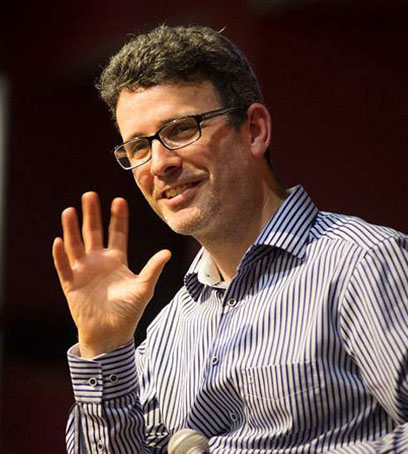
Carlos Fraenkel discussing his latest book, Teaching Plato in Palestine : Philosophy in a Divided World. Photo : CCCB © Glòria Solsona, 2016.
I recall hearing someone on the TV or radio say at the time that this was actually the kind of behaviour Donald Trump’s leadership has encouraged (altogether consciously or otherwise?). It was also something that made all too clear how Canada is far from immune to the alarming trends of 2017 in other places.
Beyond controversy over the anti-Islamophobia bill in parliament, there has not been a lot of Canadian reflection on the deeper roots of such insane events as the Quebec City mosque shooting. And I was pleased to read Carlos Fraenkel’s “In Quebec” on the London Review of Books blog for 8 February 2017. Mr. Fraenkel “teaches philosophy and religion at McGill University [in Montreal]. His latest book is Teaching Plato in Palestine.”
Just over a week later in the Toronto Star there was a somewhat related report from Chantal Hébert : “What took Charles Taylor so long to reverse his position on Quebec’s religious restrictions? … Montreal philosopher co-authored report nine years ago that recommended imposing a secular dress code. The mosque shooting now has him regretting that suggestion.”
(4) A final item from the mid to late February news raised a Canadian historical subject I have lately been pondering in the never-ending struggle to advance my current book project, tentatively entitled  Children of the Global Village – Canada in the 21st Century : Tales about the history that matters. (CW EDITORS : For the current state of this work in progress see “The Long Journey to a Canadian Republic,”at the right-hand end of the masthead bar above.)
The news item in question was discussed on both the CTV and CBC websites in : “Bellegarde calls for name change for Langevin Block” ; and “Indigenous leaders want to strip name of residential school proponent from PMO building … Hector-Louis Langevin was ‘key architect’ of Indian residential school system, AFN says.”
Hector-Louis Langevin is in fact someone whose role in the politics of the early Canadian confederation – say, 1878—1896 – I have been struggling to understand. His story is sad enough even without the blot of “’key architect’ of Indian residential school system.” (And even if he was far from alone among the politicians of his day, in his quite wrong assumptions about the future of First Nations in a country whose very name is an indigenous or aboriginal word.)
Changing the names of old buildings and/or even just getting rid of parallel infrastructure, as a matter of constructive and/or even liberating political symbolism has become a common enough objective in the identity politics of our time. And, given the various ways in which our present-day opinion of Hector-Louis Langevin is rather low, it does seem hard not to agree that it might make sense to call the building in Ottawa that houses the staff of the prime minister of Canada something other than the Langevin Block.
Given the role of the Assembly of First Nations in raising the issue right now, my first vain instinct was to propose that the building be renamed the Pontiac Block – after the fabled “War Chief of the Ottawas” whose formidable First Nations/Old Canada rebellion in 1763 (once known as the Conspiracy of Pontiac) almost certainly has more to do with the survival of Canada today as its own country in North America than we customarily allow.
And for further information here I would just point to my esteemed colleague L. Frank Bunting’s long June 2009 meditation on this website, called “There’s Pontiac .. then there’s Pontiac .. both worth a few historical tears.”
Most recently, I have also stumbled across an alternative proposal from Liberal MP Robert-Falcon Ouellette, who represents Winnipeg Centre. This involves renaming the Langevin Block the Louis Riel Block – after the legendary Canadian Métis leader whose ultimately constructive role in the politics of the early Canadian confederation has also been a current preoccupation of mine, and who certainly deserves better recognition from the present and future of Canada than he received from its past.  Personally I would welcome a renamed Louis Riel Block as successor to the Langevin Block. But in the real world of Ottawa today I wouldn’t bet too much on anything quite like this actually happening, including of course (and perhaps especially) a renamed Pontiac Block!.
(CW EDITORS : And for further information here we’d recommend our piece from February 2016 : “Two commemorations on same winter day in parts of Canada this year .. Louis Riel, the flag, and Justin P.J. Trudeau.”)

